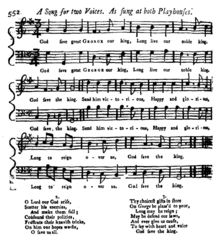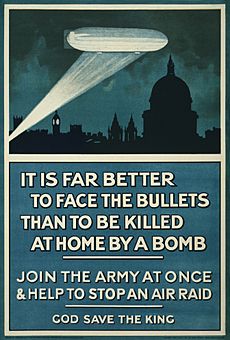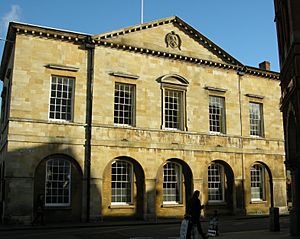God Save the King facts for kids

Publication of an early version in The Gentleman's Magazine, October 1745. The title, on the contents page, is given as "God save our lord the king: A new song set for two voices".
|
|
| National or royal anthem of |
|
|---|---|
| Also known as | "God Save the Queen" (when the monarch is female) |
| Music | Unknown |
| Adopted | September 1745 |
"God Save the King" is a very important song. It is also known as "God Save the Queen" when a female ruler is on the throne. This song is the national or royal anthem for many countries. These countries are mostly part of the Commonwealth realms, which are countries that have the British monarch as their head of state. This includes the United Kingdom and its Crown Dependencies.
No one knows for sure who wrote the music for "God Save the King". Some people think it might come from very old church music. Others sometimes say the composer John Bull wrote it.
"God Save the King" is the main national anthem of the United Kingdom. It is also one of two national anthems for New Zealand. Many British territories also use it. It is also played as a special "royal anthem" when the monarch is present. This happens in countries like Australia, Canada, Belize, Antigua and Barbuda, and The Bahamas.
The tune of "God Save the King" is so famous that other countries use it too. Even if they are not part of the old British Empire, they use the melody for their own patriotic songs. For example, it's the tune for the national anthem of Liechtenstein, "Oben am jungen Rhein". It's also used for Norway's royal anthem, "Kongesangen". In the United States, the song "My Country, 'Tis of Thee" (also called "America") uses the same melody. The tune was even used for Germany's national anthem from 1871 to 1918. It was also Russia's imperial anthem for a time. In Switzerland, it is known as "Rufst du, mein Vaterland".
The song "God Save the King/Queen" has many different versions of its words. Only the first verse usually stays the same. Over time, new verses have been added or removed. Even today, different books might show different verses. Usually, only one verse is sung. Sometimes two verses are sung, and very rarely, three.
When the monarch (King or Queen) and their spouse are present, the whole song is played. Other members of the royal family, like the Prince of Wales, get a shorter version. This shorter version is just the first six bars of the music. The first six bars are also used in some Commonwealth countries. For example, in Canada, the first six bars of "God Save the King" are played, followed by parts of "O Canada".
Contents
History of the Anthem
How the Tune Developed
The music for "God Save the King" has a long and interesting past. Some experts, like Percy Scholes, think it sounds a lot like old church music called plainsong. It also has a rhythm similar to an old dance called a galliard. Scholes found a piece of music from 1619 by John Bull that sounds a bit like the modern tune.
Other old pieces of music also have parts that sound like "God Save the King". For example, Henry Purcell wrote a piece that starts with the same notes and uses the words "God Save the King". Some people in the 1800s believed the tune came from an old Scottish carol called "Remember O Thou Man".
First Public Appearance
The first time a version of the tune very close to what we hear today was printed was in 1744. It appeared in a book called Thesaurus Musicus. The song became very popular in Scotland and England the next year, in 1745. This was when Charles Edward Stuart (also known as Bonnie Prince Charlie) landed in Scotland. The song was then printed in The Gentleman's Magazine (you can see an early version in the picture at the top).
This early printed version is a bit different from the song we know today. But it's clearly related. People started singing it in London theatres in 1745. For example, Thomas Arne arranged the tune for the Drury Lane Theatre.
Experts usually say the song's origin is "traditional." Or they say it's "traditional; earliest known version by John Bull (1562–1628)."
Original Lyrics from 1745
The words printed in The Gentleman's Magazine in 1745 were:
God save great George our king,
Long live our noble king,
God save the king.
Send him victorious,
Happy and glorious,
Long to reign over us,
God save the king!
Using the Anthem in the United Kingdom
"God Save the King" is the official song of the UK because of long-standing tradition. It's not because a law was passed or a special announcement was made. The words used in the UK are the oldest version. They are the basis for all the other versions used in Commonwealth countries.
Anthems for UK Countries
England does not have its own official national anthem. "God Save the King" is usually used for England at sports events. However, there are some exceptions. For example, in cricket, "Jerusalem" is sometimes used. Some people want England to have its own anthem. "Jerusalem" and "Land of Hope and Glory" are popular choices.
Wales has its own official national anthem, "Hen Wlad Fy Nhadau" (Land of my Fathers). Scotland uses unofficial anthems. "Scotland the Brave" was used for a long time, but now "Flower of Scotland" is more common. These anthems are used at official events and international sports matches. In Northern Ireland, "God Save the King" is still the official anthem.
At the Commonwealth Games, "God Save the King/Queen" is no longer used for all UK teams. Since 2003, Northern Irish athletes get their gold medals to the tune of "Londonderry Air" (also known as "Danny Boy"). In 2006, English winners heard "Land of Hope and Glory." But after a vote in 2010, "Jerusalem" became England's Commonwealth Games anthem. When the UK competes as one nation, like at the Olympics, "God Save the King" is used for the whole team.
Words of the Anthem in the UK
The phrase "God Save the King" is much older than the song itself. It appears many times in the King James Bible. A special prayer based on the Bible has been sung at every coronation since the year 973. This prayer includes words like "God save the King! Long live the King!"
In 1745, The Gentleman's Magazine printed "God save our lord the king: A new song set for two voices." It said the song was sung in London theatres. People often say the song was first sung in 1745 to support King George II. This was after his army lost a battle to Charles Edward Stuart.
Standard Version of the Lyrics
Here are the most common words sung in the United Kingdom:
God save our gracious King!
Long live our noble King!
God save the King!
Send him victorious,
Happy and glorious,
Long to reign over us:
God save the King!
O Lord our God arise,
Scatter his enemies,
And make them fall:
Confound their politics,
Frustrate their knavish tricks,
On Thee our hopes we fix:
God save us all.
Thy choicest gifts in store,
On him be pleased to pour;
Long may he reign:
May he defend our laws,
And ever give us cause,
With heart and voice to sing,
God save the King!
The middle verse is often not sung today. If the ruler is a Queen, the word "King" is changed to "Queen." All words like "him" or "his" are changed to "her" or "hers."
There isn't one "official" set of words for the anthem. However, the three verses above are considered the "standard" British version. They appeared in the 1745 Gentleman's Magazine and in many other songbooks.
Usually, only the first verse is sung, even at official events. Sometimes, the third verse is also sung. This happens at events like the opening ceremonies of the 2012 Summer Olympics and the Last Night of the Proms.
How the Music is Played
The music for the anthem is usually played in the key of G major. This is the same as the original published version. Sometimes, you'll hear a drum roll before the song starts. The first part of the song is played softly. Then it gets louder as it reaches "Send him victorious." It gets louder again at "over us:" leading into the final words "God save the King."
In the past, military bands sometimes played the song in a different key. This was because it was easier for their instruments. But now, most bands play it in the correct key. Since 1953, a special fanfare (a short, loud piece of music) is sometimes played before the anthem. This fanfare was written by Gordon Jacob for the coronation of Queen Elizabeth II.
How it's Performed in the UK
The way the anthem is usually played at official events was suggested by King George V. He knew a lot about it because he heard it so often! In 1933, rules were made for how fast and loud it should be played. For example, the first part should be quiet, and then more instruments join in to make it louder.
In the past, people at theatres and concerts had to stand when the anthem was played at the end of a show. This meant some people would rush out to avoid standing! This tradition still happens at some events like Wimbledon, the Royal Variety Performance, and Royal Ascot.
The anthem used to be played on the BBC and other TV channels when they finished broadcasting for the night. This practice stopped when TV channels started broadcasting 24 hours a day. However, BBC Radio 4 still plays the anthem every night. It's played as a transition before they switch to the BBC World Service. BBC Radio 4 and BBC Radio 2 also play the anthem before the news on the King's official birthday and the birthdays of other senior Royal Family members.
The UK's national anthem is usually played before The Sovereign's Christmas Message. It is also played for important royal announcements, like royal deaths. In these cases, it is played slower and more sadly.
Use in Other Commonwealth Countries
"God Save the King/Queen" spread around the world as the British Empire grew. It became the national anthem for many countries. As the Empire changed into the Commonwealth of Nations, most countries that became independent stopped using the song. However, in New Zealand, it is still one of the official national anthems.
|
Error: no page names specified (help). In Spanish: God Save the King para niños
In Spanish: God Save the King para niños
 | Chris Smalls |
 | Fred Hampton |
 | Ralph Abernathy |



